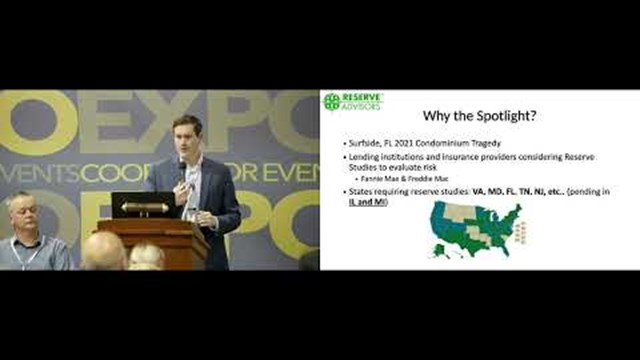
Perhaps one of the most difficult aspects of the recent recession was the sudden evaporation of credit from major banks and lending institutions. The logic behind it was understandable: too much easy credit had led, in part, to the collapse that stunned the nation and then the world in 2008.
Although some housing markets were less affected than others (Florida and Nevada have been especially hard-hit) everyone still felt the shifts. Among the repercussions was a new set of regulations issued by the Federal Housing Administration (FHA) in February 2010 which created a number of requirements for any building that wished to accept FHA-backed mortgage loans.
“Associations that do not show at least 10 percent of their annual budget being allocated to reserves will be unable to qualify for FHA certification,” says Lauren Peddinghaus, CMCA of Haus Financial Services LLC in Chicago. “ FHA certification is required for the entire association if a buyer is looking to purchase a unit with an FHA-insured mortgage. Some associations, particularly the smaller ones, do not produce an annual budget, let alone allocate funds for reserves. These associations have to implement a budget that meets the requirements before they can become FHA certified.”
A Bit of Banking Background
The Federal Housing Administration was born during the Great Depression, created by Congress in 1934 and absorbed by the Department of Housing and Urban Development’s (HUD) Office of Housing in 1965. The main purpose of the FHA is to provide mortgage insurance on loans made by FHA-approved lenders throughout the United States and its territories. The FHA insures mortgages on single family and multifamily homes, including condominium communities. According to the FHA website, it is the largest insurer of mortgages in the world, insuring more than 34 million properties since its inception. That number currently includes 4.8 million insured single family mortgages and 13,000 insured multifamily projects.
As the FHA website explains, “FHA mortgage insurance provides lenders with protection against losses as the result of homeowners defaulting on their mortgage loans. The lenders bear less risk because FHA will pay a claim to the lender in the event of a homeowner’s default. Loans must meet certain requirements established by FHA to qualify for insurance.”
A Change in the Process
In February 2010, that list of regulations grew for condo communities with new requirements issued directly by the FHA as a result of the housing situation that helped spur the recession. One requirement that has had a definite effect on condos nationwide is a regulation relating to a building’s reserve fund. “The guideline is that a condo development must have 10 percent of its yearly budget set aside for reserves,” says Orest Tomaselli, CEO of National Condo Advisors, LLC, a firm based in White Plains, New York, a company which offers condominium project loan approval and reserve analysis services.
That means, he continues, “If a condo's annual budget is $100,000, it must set aside $10,000 a year in a reserve account.” The goal behind this guideline is protective, Tomaselli says. “You don’t want a development to get into a situation where it can’t pay for necessary repairs. You’re trying to avoid special assessments.” If a building has a repair that needs to be made and not enough money in the reserve, then every resident would have to pay that assessment. “If that assessment was really high—say, an extra $1,500 a month—that creates a financial strain and stress on the resident. People can go into foreclosure, and then things get progressively worse in the building. So the FHA instituted these guidelines.”
“The FHA has come in because while the condominium associations were mandated by states to have a reserve fund, no one had established how much that reserve fund was going to have to be for each property,” says Phil Mahan of Structural Technologies in Bloomingdale, an engineering firm that produces reserve studies for buildings and HOAs. “A reserve study has to be done—in my opinion—no less than every five years. A three-year turn is not a bad cycle, but more importantly, the quality of that reserve study has to be real analysis of the building. A drive-by study or a pencil on a napkin doesn’t work. You have to have amortization, you certainly have to have the qualification from the person who is doing the onsite to make certain that they really understand how this building is deteriorating, what was potentially done improperly at the onset of the property turned over, so those are then somehow managed back into a reserve fund that will take care of those components down the road.”
Because each condo development is different, the requirement impacts different communities in unique ways. For some, 10 percent might be an affordable amount—in fact, they may already have been putting away more than that for previously-determined projects. For other developments, though, 10 percent might be a much higher amount than they need. “The issue,” says Tomaselli, “is that 10 percent is an arbitrary number. Sometimes it’s too much for a development to set aside, and sometimes it’s way too little.”
The FHA has recognized that this might be the case in some situations. With that in mind, the administration and HUD “have stated that you can provide a reserve study and have an engineer on site to literally review and inspect every common area, every roof, etc.,” to determine what repairs and replacements will be needed in the coming years. The reserve study will help the board determine that if a new boiler is going to be needed in eight years, then the community must set aside X amount of dollars of that time period to pay for that boiler. The amount determined may well be less than the 10 percent amount dictated by the FHA. In that instance, “instead of the 10 percent guideline, you can utilize that report.”
A new reserve study may also put a board in a quandary. Are you in better shape putting away 10 percent, or do you get a report and then find out you need 20 percent and aren't in a position to meet that? The questions can become complicated very quickly.
The Repercussions
If a development does not meet that 10 percent amount or another predetermined and approved amount, the FHA will not insure any mortgages for that building. “If you don’t have that 10 percent, you can’t get an FHA or Fannie Mae mortgage within the development,” Tomaselli says. It is now commonplace for attorneys to make sure that sellers are disclosing to potential buyers whether or not their building is FHA approved.
According to Peddinghaus, “A buyer who requires an FHA-insured mortgage won't be able to purchase a unit in an association that is not FHA certified. The timeline to get FHA certified, assuming the association does what is necessary to amend their budget to meet the new criteria, can be 45 days or more. That could cause a potential sale to fall through.”
For the majority of properties, however, the question becomes one of resale. “People don’t want to buy units that they can’t sell,” says Tomaselli. “Unless people come to a development with cash, they can’t buy. Or if you can, you need large down payments of 30 to 40 percent.” Although some people might pursue a purchase in a non FHA-approved building, “you’re basically taking money and burning it,” says Tomaselli. “If there’s no liquidity within that site, you have to be a buyer who absolutely knows you’re not going to sell that unit in the future. No one can say that.”
It is not just a new sale that can get thrown for a loop in a non-approved building. Refinances for current residents are also impacted. More than one financial pro has seen instances where residents have attempted to refinance their mortgage, only to see it fall through because their building has not met FHA requirements. Scrambling to come up with alternative solutions can become an incredible stress on residents who have more than enough to handle already.
Strategize and Plan
According to the pros, the best way to avoid these issues is simply to plan ahead and tackle the regulations head on. Most CPAs and financial consultants work with their clients to ensure that they are not only meeting FHA eligibility requirements, but the requirements of the banks through whom FHA is working as well. For some condos, these requirements came to light after their 2010 and 2011 budgets were already in place. Finding the extra money in a year when heating and snow removal costs sky rocketed can be a challenge, but one that can be met with the right guidance.
“Cash buyers who do not need a mortgage won't be affected,” says Peddinghaus. “Associations that are financially well-managed and produce an annual budget showing at least 10 percent allocated to reserves won't be impacted. Also, associations that have a current reserve study who can show that the reserves are funded according to the study, even if the 10 percent requirement is not met will not be affected by this criteria.”
And, adds Mahan, “You have to understand your reserve study and what it's telling you to set aside in reserve. We do full replacement costs—not a partially-funded reserve. We’re doing full funding. And that’s the way a reserve study should be done, so you have really accommodating special assessments and loans. But the reality is that if I’m in a property that needs to replace a roof next year, and it’s a $200,000 expense, the reserve fund is $100,000 right now and they’re gonna collect another $50 [thousand], they would bankrupt their reserve instantaneously, so they have to go get a loan. That’s the thing that the FHA didn’t really accommodate, no one really wanted to say ‘OK, the reserve fund isn’t adequate.’”
For his part, Tomaselli recommends that boards “should be talking to their attorneys.” The process for earning approval can be a long one. The board will need to prepare documents for lenders, prepare a new budget, hire a professional engineer to prepare the reserve study—it’s not an easy road to travel but professional assistance can make it a bit easier.
It is also important, Tomaselli says, to keep residents informed. After all, it is their property and their financial future that is most tied up in this process. “My first advice is always for the community to get together and discuss this. Let owners know where they are in the process and what’s going on. Provide training and education for residents.”
Will these FHA guidelines change again in the future? Possibly. If the FHA and Fannie Mae finds itself issuing a lot of waivers or finds “that hardly anyone qualifies, it may change the rules, but it’s hard to tell,” says one accountant. In the meantime, it’s better to be prepared and compliant.
Without question, the last several years have been difficult ones for condo communities and unit owners as they have struggled to overcome the Great Recession and the national bursting of the housing bubble. While the Federal Housing Administration’s 10 percent rule may be causing some financial stress as buildings try to shore up their bottom lines, the ultimate goal is to provide a more stable future for residents, seeking to reduce unexpected assessments. As with most things in life, a little bit of preparation will go a long way, not only in meeting FHA requirements but in ensuring a healthier tomorrow for condo communities throughout the Chicagoland area.
Liz Lent is a freelance writer and a frequent contributor to The Chicagoland Cooperator.






Comments
Leave a Comment